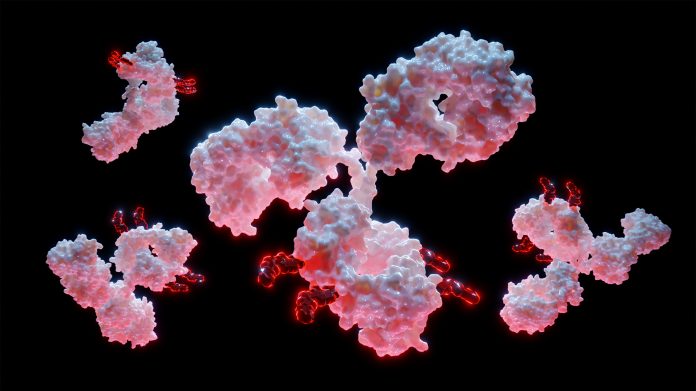
Bristol Myers Squibb (BMS) will co-develop SystImmune’s BL-B01D1, a potentially first-in-class EGFRxHER3 bispecific antibody-drug conjugate (ADC) in the United States. The deal is worth potentially more than $8B.
“Recent BL-B01D1 trials have shown broad potential across different solid tumors as well as a manageable safety profile,” said Yi Zhu, CEO at SystImmune.
There have been several deals worth potentially $1B or more around ADCs this year. In early April, BioNTech inked a deal with Duality Biologics worth up to $1.5B. Soon after, Bristol Myers Squibb signed a deal worth up to $1B for Tubulis to use the biotech’s “PS conjugation platform” to develop ADCs against solid tumors. In May, Eisai inked a clinical trial collaboration worth up to $2B with Bliss Biopharmaceutical.
The biggest deal of all was Pfizer’s $43B acquisition of ADC specialist Seagen in March. The acquisition of Seagen (formerly Seattle Genetics) doubled Pfizer’s early-stage oncology clinical pipeline. Four of the more than twelve FDA-approved and marketed ADCs have been developed using Seagen’s technology.
Daiichi Sankyo has several ADCs in development and the blockbuster Enhertu, which it developed with AstraZeneca. That drug, which targets a new class of HER-2 low tumors, rebooted the ADC field and led to a surge in Daiichi Sankyo oncology sales.
The global market for ADCs is already worth several billion dollars, and is expected to grow considerably over the next decade. There are over 100 of these drugs in clinical trials.
Bristol Myers Squibb will pay SystImmune $800 million in an upfront payment and up to $500 million in contingent near-term payments. SystImmune is eligible to receive additional payments of up to $7.1 billion contingent upon the achievement of certain development, regulatory, and sales performance milestones for a total potential of up to $8.4 billion.
SystImmune will be responsible for development, commercialization, and manufacturing in Mainland China. Bristol Myers Squibb will assume responsibility for development and commercialization of the drug in the rest of the world.
BL-B01D1, a bispecific topoisomerase inhibitor-based ADC which targets both epidermal growth factor receptor and human epidermal growth factor receptor 3 (EGFRxHER3), is currently being evaluated in a global multi-center Phase I study (BL-B01D1-LUNG101) in patients with metastatic or unresectable non-small cell lung cancer (NSCLC).
Data from earlier clinical studies of BL-B01D1 were presented in 2023 at ASCO, ESMO, and the San Antonio Breast Cancer Symposium; the company says these data demonstrate promising anti-tumor activity in patients with a range of solid tumors that had progressed after standard of care treatments, including NSCLC and breast cancer.
“Our collaboration with SystImmune allows us to strengthen our leadership in oncology and is consistent with our strategy to diversify beyond immuno-oncology to transform patient care,” said Samit Hirawat, MD, Executive Vice President, Chief Medical Officer, Drug Development at Bristol Myers Squibb.
He added that, “SystImmune’s BL-B01D1 adds yet another ADC to our diverse pipeline and helps strengthen our approach of matching the most appropriate therapeutic modality to areas of unmet medical need across solid tumor oncology. We look forward to working with SystImmune to advance BL-B01D1 in hopes of offering a differentiated treatment option for patients in need.”













